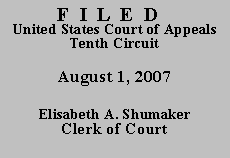

On April 20, 2004, a jury convicted Romero of five counts of distribution of a controlled dangerous substance in the District Court of Stephens County (Oklahoma), Case No. CF-1999-428. Romero was sentenced to thirty-years' imprisonment on each of the counts, with the sentences to run consecutively. Romero filed a direct appeal, arguing that three instances of prosecutorial misconduct during closing argument violated his right to a fair trial and resulted in an excessive sentence: (1) the prosecutor improperly referred to Romero as "the Wal-Mart" of "the methamphetamine world"; (2) the prosecutor incorrectly summarized the amount of methamphetamine purchased from Romero during five controlled drug buys; and (3) the prosecutor argued facts not in evidence in attempting to justify why Romero was not arrested after the first controlled drug buy and why law enforcement authorities arranged for four more controlled purchases from him. On August 26, 2005, the Oklahoma Court of Criminal Appeals (OCCA), applying a plain error standard of review, rejected Romero's arguments and affirmed his convictions and sentences.
Romero filed a federal habeas petition on October 14, 2005, asserting the same claims of prosecutorial misconduct that he raised on direct appeal. The magistrate judge assigned to Romero's case issued a report and recommendation, recommending that the petition be denied. In the magistrate judge's view, the prosecutor's Wal-Mart analogy, "while colorful, was a reasonable inference based on the evidence that [Romero] was able to procure an ample supply of methamphetamine and deliver it on demand." ROA, Doc. 6 at 7. With respect to the prosecutor's alleged incorrect summary of the amount of methamphetamine, the magistrate judge noted that "the evidence establishing [Romero's] guilt on five charges of distributing illegal drugs was quite strong," and "the trial court sustained defense counsel's objection to one of the comments and further instructed the jury to decide the case on the evidence presented at trial." Id. at 9. As for the prosecutor's alleged reference to facts not in evidence, the magistrate judge concluded "that evidence exist[ed] to support the prosecutor's statement," and that the statement was "invited . . . by defense counsel" and thus "easily f[ell] within the wide latitude of argument allowed to prosecutors . . . ." Id. at 11. Ultimately, the magistrate judge concluded that "the OCCA's rejection of [Romero]'s claims of prosecutorial misconduct was not contrary to or an unreasonable application of clearly established federal law, as reflected in the decisions of the United States Supreme Court." Id. at 12.
On March 20, 2007, the district court adopted the report and recommendation, denied Romero's habeas petition, and entered judgment against Romero. Romero filed a notice of appeal (No. 07-6070) from the district court's judgment. On March 27, 2007, the district court denied Romero's request for COA, and Romero filed a separate notice of appeal (No. 07-6076) from that order. On May 4, 2007, the district court denied Romero's request to proceed on appeal in forma pauperis, and Romero filed a separate notice of appeal (No. 07-6112) from that order as well.
Romero has now renewed his request for a COA with this court. Romero has also filed a motion to proceed in forma pauperis on appeal.
Issuance of a COA is jurisdictional. Miller-El v. Cockrell, 537 U.S. 322, 336 (2003). In other words, a state prisoner may appeal from the denial of federal habeas relief under 28 U.S.C. § 2254 only if the district court or this court first issues a COA. 28 U.S.C. § 2253(c)(1)(A). A COA may be issued "only if the applicant has made a substantial showing of the denial of a constitutional right." Id. § 2253(c)(2). In order to make that showing, a prisoner must demonstrate "that reasonable jurists could debate whether (or, for that matter, agree that) the petition should have been resolved in a different manner or that the issues presented were adequate to deserve encouragement to proceed further." Slack v. McDaniel, 529 U.S. 473, 484 (2000) (internal quotation marks omitted).
Here, the magistrate judge carefully and thoroughly analyzed Romero's claims before recommending that his petition be denied. In doing so, the magistrate judge correctly outlined the standards governing federal habeas petitions. The magistrate judge then properly identified the controlling Supreme Court precedent for Romero's claims of prosecutorial misconduct. See Donnelly v. DeChristoforo, 416 U.S. 637, 643 (1974) (holding that where no specific Bill of Rights guarantees are implicated, prosecutorial misconduct must have so infected the trial with unfairness as to make the resulting conviction a denial of due process). Lastly, the magistrate judge painstakingly reviewed each of the complained-of prosecutorial comments, together with the trial transcript as a whole, and concluded that the OCCA's resolution of those claims was not contrary to, or an unreasonable application of, Donnelly. After conducting our own review of Romero's application for a COA, his appellate brief, and the record on appeal, we conclude that the magistrate judge's conclusions, which were adopted in full by the district court, are unassailable. In other words, we conclude that no reasonable jurist "could debate whether (or, for that matter, agree that)" any of Romero's claims "should have been resolved in a different manner or that [they] were adequate to deserve encouragement to proceed further." Slack, 529 U.S. at 484 (internal quotation marks omitted).
The motion for leave to proceed on appeal in forma pauperis and the request for a COA are DENIED and the appeal is DISMISSED.
Entered for the Court
Mary Beck Briscoe
Circuit Judge
*.This order is not binding precedent, except under the doctrines of law of the case, res judicata, and collateral estoppel.